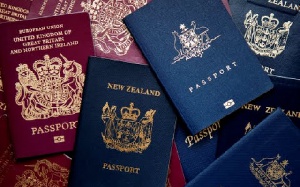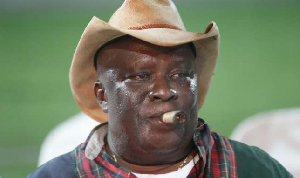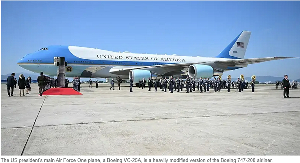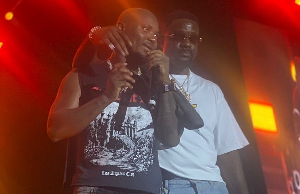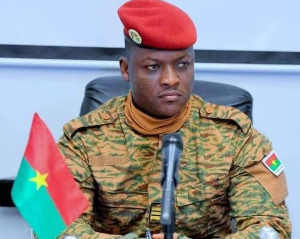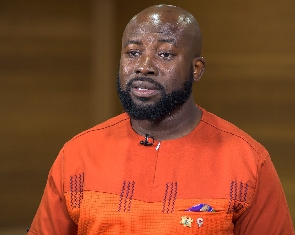It is good that this issue has now bubbled up to the surface, occasioned by the 2020 general elections. Hopefully, finality will be brought to this issue in the interest of fairness, for it appears quite obvious that the laws on citizenship in Ghana are not in conformity.
By now, the NDC is probably strategizing about how to ward off any attack on the Assin North MP, Gyakye Quayson, who has already participated in parliamentary proceedings by voting to elect the Speaker, Alan Bagbin. Similarly, the NPP is also probably strategizing about how to press on with the ‘illegality’ allegation of Gyakye Quayson’s election, in hopes of assuring a wider parliamentary majority.
Whether the NDC will want to see Quayson stepping down and going to jail for breaking the law out of ‘love’ for his NDC, or whether the NPP will want to see an act of revenge in the Adamu Sakande case that saw Mahama Ayariga re-taking up Sakande’s seat in Bawku, is a wait and see game now.
Sakande was first elected into Parliament in December 2008 general election on the ticket of the NPP as MP for the Bawku Central Constituency in the Upper East Region. He was subsequently found guilty of “perjury and forgery,” and sentenced to two years in prison. He was alleged to have, before the 2008 elections, made a false statement in an application to have his name registered in the voters' register and subsequently went ahead to vote in the December 2008 general elections, when he was not entitled to do so per Article 94 (2) (a).
With regards to Gyakye Quayson, he was elected on the ticket of the NDC as MP for Assin North in the Central Region in December 2020. His case appears to center on at what stage does Article 94 (2) (a) become applicable? Is it at the time of filing of the nomination to stand for the elections or at the time the person is to be sworn in as an MP after the elections? (Senya, 2021).
The EC officially announced that aspirants for the December 7, 2020 Elections in Ghana were to file their nomination from October 5 to 9, 2020 (Frimpong, 2020). A certificate of renunciation issued by Canada to Quayson made him a non-Canadian citizen effective November 26, 2020 (Senya, 2021). That was some 48 clear days after Gyakye Quayson had made an alleged false statement in an application to have his name registered in the voters' register, and subsequently went ahead to vote in the December 2020 general elections when he was not entitled to do so per Article 94 (2) (a).
A Cape Coast High Court issued an “order of interlocutory injunction restraining Gyakye Quayson from holding himself as the MP-elect for the Assin North constituency until the final determination of the case” (Asiedu-Addo & Mensah, 2021). So now, does Article 94 (2) (a) become applicable at the time of filing of the nomination to stand as the MP candidate or at the time the person is to be sworn in as an MP after the elections? If the case is the former, does that imply perjury or making false statement of declaration in an application before the EC, was committed? We wait on the Court to decide.
POSITION OF THE LAWS OF GHANA ON DUAL CITIZENSHIP
The Citizenship Act, 2000 (Act 591), section 16 (1) states: “A citizen of Ghana may hold the citizenship of any country in addition to his citizenship of Ghana.” That is, DUAL CITIZENSHIP is permitted under the laws of Ghana, and is not illegal.
The 1992 Constitution Article 94 (2) (a) states: “A person shall not be qualified to be a Member of Parliament if he – (a) owes ALLEGIANCE [emphasis added] to a country other than Ghana.”
So clearly, the issue is about ALLEGIANCE and NOT about DUAL CITIZENSHIP.
BUT HOW CAN ALLEGIANCE BE DETERMINED OR MEASURED?
But how does one determine or measure ALLEGIANCE, which according to one of Shakespeare’s writings, Macbeth, “there is no art to find the mind’s construction in the face.” ALLEGIANCE AND CITIZENSHIP are like the MIND and the BRAIN; the brain being the physical or the objective material for the functioning of the mind. The mind is spiritual and the brain is physical.
In other words, the mind, being spiritual, cannot be measured or is of indeterminate essence, but the brain, being physical, can readily be determined and/or identified. Similarly, allegiance being subjective or ‘spiritual’ cannot really be determined, but citizenship can more readily be determined or measured or evidenced by physical documents, such as a passport.
Any determination or measurement of ALLEGIANCE, for our purpose, can only be ‘seen’ or evaluated from observed phenomenon or records of behaviors or actions of individuals in a country. That may possibly be the only empirical evidence of ALLEGIANCE. For example, a subversive action, such as overthrowing a national Constitution in a military coup may be empirical evidence of the absence of loyalty or allegiance to a country, irrespective of whether one has previously sworn an oath of allegiance. Thus Allegiance can only be determined or measured only after the fact, and not before the fact.
In Bilson Vs. Rawlings, as cited in my previous article, there is no “ALLEGIANCIOMETER” for measuring allegiance. All it takes to measure allegiance is to take the Bible, the Quran, the Bhagavad Gita, or any Holy Book of creed that one subscribes to, and swear an oath of allegiance, anytime one is confronted with having to assume a high political office.
This means that Gyakye Quayson, having already sworn such an oath of allegiance, legitimately owes allegiance to Ghana as MP for Assin North, because he chose to swear his allegiance or give his loyalty to Ghana for the position of MP. If such should become the case, then we need to consider exonerating and offering posthumous reparation, somehow, to the family of Adamu Sakande for the injustice done to him.
In their theories and practices of motivation, which has become an integral part of modern management, what Abraham Maslow and Frederick Herzberg really revealed were the fact that human motivations are deeply rooted in self-interest. For example, Maslow’s “Hierarchy of Needs” Theories,” from (a) Physiological, (b) Safety and Security, (c) Social, (d) Self-esteem, and culminating in (e) Self-actualization or realization needs, the lifeblood that ensures the functionality of motivation is grounded in Self-interest. That is, without Self-interest first, none of the needs levels and appeals to them will work or motivate.
This is because of the self-evident fact that human nature has individual needs that must be fulfilled. This happened the moment God individualized Himself in each and every one of us. Simply and unfortunately, the fact remains that we each have a responsibility to ourselves. Thus, because of self-interest, allegiance cannot be static. Allegiance is dynamic, and subject to change based upon the individual’s circumstances and needs. That is why we have traitors, even among Mono-Citizens.
THE SCRIPTURES’ POSITION ON ALLEGIANCE
A good friend of mine raised a very interesting Biblical quotation from the Bible to bolster his argument as to why Dual Citizens should be excluded from participating in the political space as MPs. His argument was taken from Matthew 6: 24 that states, “No man can serve two masters: for either he will hate the one, and love the other; or else he will hold to the one, and despise the other. Ye cannot serve God and MAMMON [emphasis added].”
But what exactly does “Mammon” means in the Bible?
“The word ‘mammon’ is a Syriac word, and signifies money, wealth, riches, substance, and everything that comes under the name of worldly goods. Jerom [sic] says, that riches, in the Syriac language, are called “mammon”; and so the word is often used in the above senses, in the Chaldee paraphrases” (“Matthew 6:24 – Meaning and Commentary on Bible Verse,” 2021).
Mammon is associated with “unrighteousness and represents something that is at odds with service to God” (Britannica, 2021).
If the Dual Citizen was to serve as MP for Ghana and MP for UK simultaneously for monetary compensation, then probably, he would be serving both “God and mammon.” For example, if Sakande or Gyakye Quayson had become an MP for Ghana and MP for the UK or Canada respectively and simultaneously, then probably they were both serving “God and mammon.” But those are totally IMPOSSIBLE to do that in practice! Probably, theoretically, that may be possible.
The fact that they both chose to swear an oath of ALLEGIANCE to serve one country, that is Ghana, when they had a chance to choose among two countries is, of itself, an attestation to the fact of their ALLEGIANCE to Ghana. Why not UK or why not Canada? So in reality, the Dual Citizen cannot serve two countries in the same capacity at the same time. That is, it is impossible for the Dual Citizen to serve two masters or countries in similar capacity simultaneously. He cannot be in two places at the same time for the question of allegiance to even arise.
THE GENESIS OF THE EXODUS INTO DUAL CITIZENSHIP
In 1992, a military revolution occurred in Ghana. A three-year curfew was imposed on the whole country, as the then military regime wanted to effectively monitor any counterinsurgency, by restricting people movements. There were excesses, as some dissidents were abducted in the dead of the night from their families, never to be seen alive again. An example was the abduction and subsequent murder of Justice Agyapong, Justice Sarkodie, Mrs. Justice Koranteng Addo, and retired Major Acquah. They were elite members of the society, and one can only imagine what may have happened to the less elite and prominent members. Several Ghanaians fled the country for their lives. They became both political and economic refugees. They needed to survive in foreign lands and they had offspring too.
Over the years, as a result of living and participating in the daily lives of their host countries, they assimilated into those cultures, living and acting same.
Those Diaspora Ghanaians “were contributing by way of heavy monetary remittances to and investment in Ghana and since dual citizenship helped them to access [better] employment outside Ghana, dual citizenship should be allowed. … the idea of the ‘economic refugees’ status of most Ghanaians has become a reality of Ghana today. Whatever the moral objections that may be to this to reality, it is an acknowledged fact that most of these refugees invariably bring home their economic gains abroad. Some invest such gains in useful ventures which compliment the domestic mobilisation [sic] of financial resources to national development. (Report of the Committee of Experts (Constitution) on Proposals for a Draft Constitution of Ghana, Chapter 17, paragraph 374 – 381.
This view helped inform the passage of the Citizenship Act, 2000 (Act 591), section 16 (1) referenced above, which states: “A citizen of Ghana may hold the citizenship of any country in addition to his citizenship of Ghana.”
In 2017, the World Bank determined that Diaspora Ghanaians remitted US$ 2.2 billion that helped Ghana’s economic development. Nigeria’s private capital inflow at the same period was US$22.3 billion, while that of Senegal was US$2.3 billion. Those remittances are projected to grow each year (The United Nations Conference on Trade and Development, 2018). It doesn’t come as any surprise then that Nigeria and Senegal do not bar their natural born dual citizens from participating fully in the political space.
BUT WHY THE NECESSITY AND PERSISTENT RELUCTANCE TO REPEAL ARTICLE 94 (2) (a) TO ALLOW DUAL CITIZENS TO PARTICIPATE FULLY IN THE POLITICAL SPACE?
First, the Law became ‘necessary’ to protect and insulate the 1982 revolutionary leaders from imagined revenge by the Diaspora Ghanaians who fled the country and left their properties, happiness, and businesses behind. It is akin to the scene of Shakespeare’s Macbeth: after killing King Duncan and seeing his son Banquo, the true heir to the throne, flee the country, Macbeth’s nightmare was having Banquo return someday with mercenaries to reclaim what was rightfully his.
In hindsight, what can be said to be a principal achievement of that revolution has been that the country has since not witnessed another coup, underpinned by African regional organizations repugnance to coups, which retards economic development. But in terms of its avowed aim of instilling probity, accountability, integrity, and eliminating corruption, the country never succeeded. In fact, it got even worse, when its leader, Jerry Rawlings, left the scene of power.
Second, the parliamentary system that has survived, following the transition into democratic governance, with the advent of the 1992 Constitution, has created in its wake Members of Parliament, responsible for repealing laws. Some MPs may perceive the maintenance of the said Law (i.e., Article 94 (2) (a)) as some kind of insulation that affords them a competitive advantage. Quite obviously, they must be keenly aware that many Diaspora Ghanaians have acquired some expertise in several fields of formal education in foreign lands when they fled atrocities and extra judiciary killings, as well as their acquisition of relatively significant wealth (thanks to the current foreign exchange rate).
Thus, removing a law that would enable them to participate fully and freely in the political space will place those MPs at a great competitive disadvantage. Therefore, maintaining that status quo will be in their best self-interest. Remember, as I mentioned earlier in Maslow and Herzberg’s theories, human motivations are primarily rooted in self-interest.
As for the argument that in the most unlikely event that war should occur between Ghana and another country, the Dual Citizens may side with their other country, that is the most frivolous and lame of arguments, serving only to conceal one’s fears, insecurity, jealousy, envy, and empty excuses.
In fact, so-called Mono-Citizens have betrayed the Constitution and for that matter broken their oath of allegiance far many times than Dual Citizens. There is not a single Dual Citizen who has done so much harm to the State in that regard, with the exception of Rawlings. That is a historical fact. Kotoka, Afrifa, and Acheampong have all, at some point, exhibited disloyalty to the State through their military coups.
WHY NOT RENOUNCE AND PARTAKE IN THE POLITICAL SPACE IF YOU REALLY WANT TO?
This is a common refrain among certain people. Those who tow this line ignore the obvious fact that those Diaspora Ghanaians have, over the years of residing in those host countries, created children and close relatives. Some may be quite young and may need parental guidance during their formative years. Others too may be experiencing disability problems. What if one were to renounce and later may need to attend to family members who may urgently stand in need of his help in one way or the other in certain areas of life? Does one then has to wait for the uncertain visa acquisition before he can timely get close to an ailing, frail, or wayward relative? Such may be a major consideration against renunciation. Anyone who argues along this line is grossly disregarding the fact that human beings are very social creatures.
THE TRUE AND SUBSTANTIVE ISSUE FOR CONSIDERATION
Law is Law, and Ghana laws must be enforced. But to stipulate in one Law (The Citizenship Act, 2000 (Act 591), section 16 (1)) that a person can become a Dual Citizen, while simultaneously legislating that the same person cannot participate in certain activities of a citizen under another Law (1992 Constitution Article 94 (2) (a)) is clearly hypocritical and conflicting. It must be repealed. I can understand if, the very highest offices, like the president and vice president demand renunciation like in the US where such positions should be occupied by citizens by Birth and not by Naturalization.
There can only be full citizenship, with all citizenship rights, but not fractional citizenship. Fractional citizenship is what the law, as it currently stands, is actually advocating. But it has shown for the second time, that is, in the 2008 elections (Sakande) and in the 2020 elections (Gyakye Quayson) that it is quite capable of becoming a constitutional time bomb and needs to be repealed.
That explains why the President, Nana Akufo-Addo, promised in 2019 that he will soon place before Parliament a Bill that will allow Dual Citizens to hold public office (Dapatem, 2019). Hopefully, this Bill will come soon, now that the President has won a second term.
REFERENCES
Asare Vrs Attorney General (J1 / 6 / 2011) [2012] GHASC 31 (22 May 2012). Retrieved on January 25, 2021, from, https://ghalii.org/gh/judgment/supreme-court/2012/31
Asiedu-Addo, S. & Mensah, E. (2021). “Stop holding yourself as Assin North MP-elect – Court orders Quayson” Retrieved on January 25, 2021, from, https://www.graphic.com.gh/news/politics/stop-holding-yourself-as-assin-north-mp-elect-court-orders-quayson.html
Britannica. (2021). “Mammon biblical literature.” Retrieved on January 25, 2021, from, https://www.britannica.com/topic/mammon
Dapatem, D. A. (2019). “Dual Citizens to hold public office.” Retrieved on January 27, 2021, from, https://www.graphic.com.gh/news/general-news/dual-citizens-to-hold-public-office-bill-to-be-placed-in-parliament-prez.html
Frimpong, E.D. (2020). “2020 Elections: Presidential and parliamentary aspirants to file nomination from Oct 5 to 9.” Retrieved on January 25, 2021, from, www.graphic.com.gh/news/politics/elections-presidential-and-parliamentary-aspirants-to-file-nominations-from-oct-5-to-9.html
“Matthew 6:24 – Meaning and Commentary on Bible Verse,” (2021). Retrieved on January 25, 2021, from, www.biblestudytools.com/commentaries/gills-exposition-of-the-bible/matthew-6-24.html
Senya, E. K. (2021). “Assin North MP-elect renounced his Canadian citizenship in Nov. 2020.” Retrieved on January 25, 2021, from, https://awakenewsroom.com/assin-north-mp-elect-renounced-his-canadian-citizenship-in-nov-2020/
The United Nations Conference on Trade and Development (2018). Retrieved on January 25, 2021, from, https://www.policycenter.ma/opinion/harnessing-diaspora-africa%E2%80%99s-socio-economic-development-ghana%E2%80%99s-year-return-2019#.YA6pWHx8vIU
Opinions of Friday, 29 January 2021
Columnist: Dr. Charles Addo

